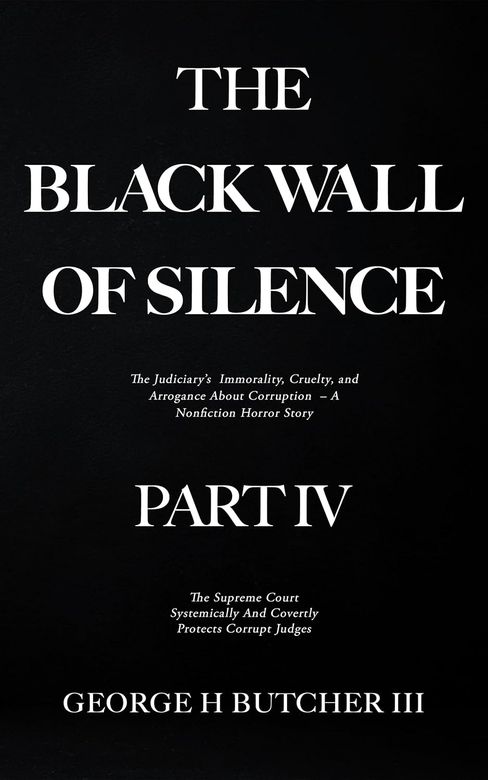The final chapter of a jaw-dropping exposé about the federal judiciary’s past and present conduct, The Black Wall Of Silence Part IV by George H. Butcher III hammers home a final nail in the coffin of judicial impartiality.
Just a few decades ago, the premise of this four-book series may have seemed like a long-form conspiracy theory, and many of these allegations would have remained unknowable and unprovable in a time before the Internet and collective calls for greater transparency in the judiciary. Today, many will have noticed shifts in America’s federal judiciary and the monumental shifts in apolitical tradition, not to mention the scandals, biases, and lack of recusals that have plagued the highest levels of the court system. Through this series, Butcher has provided a real-time critique of the aberrant behavior of current Supreme Court Justices, along with a multitude of other circuit and district judges and officials, leading to a comprehensive takedown of “business as usual” in the federal court system.
Presenting a fact-based and passionately defended argument for widespread judicial reform and stronger standards of accountability for judges at all levels of the judiciary, this book is the closing argument of a powerful indictment that should shake our collective sense of justice to the core. Unlike the previous installments of this series, this book is notably less personal, instead focused on the large-scale problems of the system that directly affects millions of people every year, as opposed to the author’s own experience with the judicial system, which somewhat clouded previous installments.
Chapters 11 and 12 are more general in nature, clearly defining corruption and proposing ways it can be identified, eliminated, and rectified. Chapter 13, which is the longest and most impartially damning section of the text, includes an investigation of judicial and qualified immunity that feels incredibly relevant and timely, given the ongoing conflicts of interest on the Supreme Court and the perennial rise of police killings that result in limited consequences. Chapter 14 takes a slightly different tack, presenting certain Supreme Court judges and their decisions as sinister, tapping into the reader’s sense of empathy, and working hard to cement the judiciary as the titular “nonfiction horror story.” However, in a subject so reliant on strict law and facts, this emotional appeal can diminish the author’s authority, but that is much less of an issue in Part IV.
Each of these books is a unique mixture of professionalism and passion, laced with inflammatory language and scandalous accusations that are rarely seen in the context of an academic argument against governmental structure and policy. Ultimately, Butcher seizes the authority of a firebrand, bringing complex subjects and dangerous contradictions to light, so his occasional bursts of informal writing become a stark reminder of his humanness in the face of a corrupt monolith – a feeling of a righteous David vs Goliath. For the sake of eliminating some redundancy and improving some less polished passages, a final proofread is recommended, but Butcher has clearly poured his time and determined focus into this work.
All told, this incendiary and informative series – and this book in particular – is essential reading for anyone who feels that the federal judiciary needs to change, providing the resolute fuel for change, and a guideline to achieve it.
Book Links
STAR RATING
Design
Content
Editing
Get an Editorial Review | Get Amazon Sales & Reviews | Get Edited | Get Beta Readers | Enter the SPR Book Awards | Other Marketing Services
























Leave A Comment